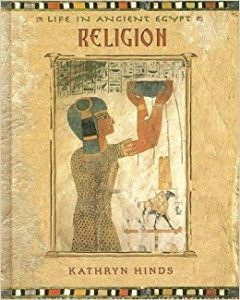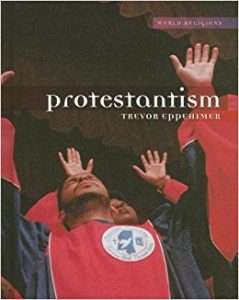 Describes the role of religion in ancient Egypt during the New Kingdom period, from about 1550 BCE to about 1070 BCE, including the diverse gods and goddesses the people worshipped, their creation myths, and the role of priesthood
Describes the role of religion in ancient Egypt during the New Kingdom period, from about 1550 BCE to about 1070 BCE, including the diverse gods and goddesses the people worshipped, their creation myths, and the role of priesthood
Young Adult (ages 14-18)
Material appropriate for young adults
Hinduism (World Religions)
Judaism (World Religions)
Islam (World Religions)
Protestantism (World Religions)
American Born Chinese

Awards
2007 Michael L. Printz Award
Take a closer look at American Born Chinese as examined in WOW Review.
Tamar: A Novel Of Espionage, Passion, And Betrayal

Now available – the Carnegie Medal winner comes to the U.S.
When her grandfather dies, Tamar inherits a box containing a series of clues and coded messages. Out of the past, another Tamar emerges, a man involved in the terrifying world of resistance fighters in Nazi-occupied Holland half a century before. His story is one of passionate love, jealousy, and tragedy set against the daily fear and casual horror of the Second World War — and unraveling it is about to transform Tamar’s life forever.
From acclaimed British sensation Mal Peet comes a masterful story of adventure, love, secrets, and betrayal in time of war, both past and present.
Featured in Volume II, Issue 1 of WOW Review.
The Lake Atitlan Reference Guide
 The Lake Atitlan Reference Guide is an eco-cultural guide to the lake identified by Aldous Huxley (Brave New World) as “the most beautiful lake in the world.” Atitlan is a volcanic caldera, located at 5,000 ft above sea level in the Mayan highlands of Guatemala. Atitlan means “at the water.” It is a fusion of simple Nahuatl words that belies the complexity of the entity it identifies. Lake Atitlan is both a place and an event in motion. Its life incorporates the visually stunning character of one of nature’s most ambitious creations and the extraordinarily diverse cultural character of the human life that the Lake has drawn to its shores. Atitlan was born violently, long ago, probably before the emergence of man here. Scientists still debate the exact nature of its birth, an event which created a nearly circular depression of 11 miles in diameter, 95 square miles of area, and over 1,000 feet deep. The cause of this huge cavity, a chain of events which began with an immense eruption, produced a unique microenvironment that has been drawing wanderers to the Lake’s shores for at least thousands of years. Cultures have clashed to control it. Vagabonds have been absorbed by it, laid down roots, and quit “moving on.” Traveling notables have been overwhelmed by its beauty and written about it in the loftiest of terms. Any effort to empirically order the kaleidoscope of its elements is ultimately challenged by the spiritual and physical immensity of the subject. This work makes no such attempt. What is offered here instead is a summary of the Lake environment in terms of its physical location and nature, its cultural history, and its contemporary political and socioeconomic life. The text is supported by more than 100 quality fotos (most in color) and a variety of other illustrations.
The Lake Atitlan Reference Guide is an eco-cultural guide to the lake identified by Aldous Huxley (Brave New World) as “the most beautiful lake in the world.” Atitlan is a volcanic caldera, located at 5,000 ft above sea level in the Mayan highlands of Guatemala. Atitlan means “at the water.” It is a fusion of simple Nahuatl words that belies the complexity of the entity it identifies. Lake Atitlan is both a place and an event in motion. Its life incorporates the visually stunning character of one of nature’s most ambitious creations and the extraordinarily diverse cultural character of the human life that the Lake has drawn to its shores. Atitlan was born violently, long ago, probably before the emergence of man here. Scientists still debate the exact nature of its birth, an event which created a nearly circular depression of 11 miles in diameter, 95 square miles of area, and over 1,000 feet deep. The cause of this huge cavity, a chain of events which began with an immense eruption, produced a unique microenvironment that has been drawing wanderers to the Lake’s shores for at least thousands of years. Cultures have clashed to control it. Vagabonds have been absorbed by it, laid down roots, and quit “moving on.” Traveling notables have been overwhelmed by its beauty and written about it in the loftiest of terms. Any effort to empirically order the kaleidoscope of its elements is ultimately challenged by the spiritual and physical immensity of the subject. This work makes no such attempt. What is offered here instead is a summary of the Lake environment in terms of its physical location and nature, its cultural history, and its contemporary political and socioeconomic life. The text is supported by more than 100 quality fotos (most in color) and a variety of other illustrations.
The Ask And The Answer: Chaos Walking: Book Two
Part two of the literary sci-fi thriller follows a boy and a girl who are caught in a warring town where thoughts can be heard — and secrets are never safe.Reaching the end of their tense and desperate flight in THE KNIFE OF NEVER LETTING GO, Todd and Viola did not find healing and hope in Haven. They found instead their worst enemy, Mayor Prentiss, waiting to welcome them to New Prentisstown. There they are forced into separate lives: Todd to prison, and Viola to a house of healing where her wounds are treated. Soon Viola is swept into the ruthless activities of the Answer, aimed at overthrowing the tyrannical government. Todd, meanwhile, faces impossible choices when forced to join the mayor’s oppressive new regime. In alternating narratives — Todd’s gritty and volatile; Viola’s calmer but equally stubborn — the two struggle to reconcile their own dubious actions with their deepest beliefs. Torn by confusion and compromise, suspicion and betrayal, can their trust in each other possibly survive?
Last December
 A teenager, struggling with depression and contemplating suicide, tries to sort out his emotions in a letter to his unborn sister. Fifteen-year-old Steven is struggling with depression and contemplating suicide. He decides to write a letter to his unborn sister explaining why he is wants to end his life. She needs to know about the girl from his new high school and how the freckles on her arm make him go crazy. She needs to know about the Toronto Maple Leafs and trying out for the school hockey team. She needs to know about Byron, all his ideas about chaos and coolness and trying to keep it together. Steven doesn’t know why his mother’s having a baby in the first place … and if the baby is actually a she. Whatever happens, though, Steven knows one thing: he needs to get this all down, so that someday his baby sister will know what happened to him – to all of them – last December.
A teenager, struggling with depression and contemplating suicide, tries to sort out his emotions in a letter to his unborn sister. Fifteen-year-old Steven is struggling with depression and contemplating suicide. He decides to write a letter to his unborn sister explaining why he is wants to end his life. She needs to know about the girl from his new high school and how the freckles on her arm make him go crazy. She needs to know about the Toronto Maple Leafs and trying out for the school hockey team. She needs to know about Byron, all his ideas about chaos and coolness and trying to keep it together. Steven doesn’t know why his mother’s having a baby in the first place … and if the baby is actually a she. Whatever happens, though, Steven knows one thing: he needs to get this all down, so that someday his baby sister will know what happened to him – to all of them – last December.




